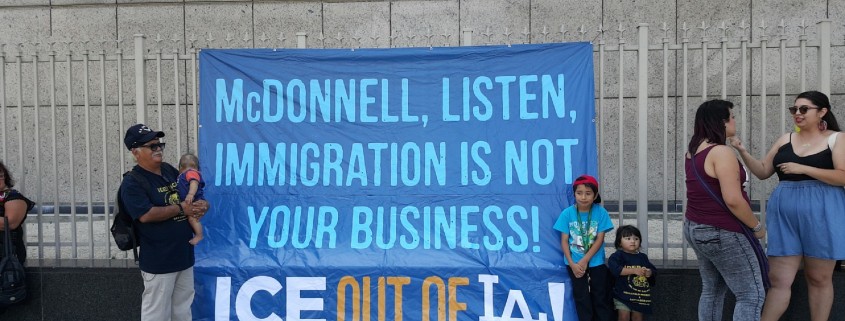Scapegoated, Again: Immigrant Communities & The Need For Community Trust Policies
The only sanctuary that an undocumented member of our society can find from a life of uncertainty is a community that positions every one of its members to live their potential. Policies that reflect the trust essential to this vision’s realization, in turn, reflect the value of these communities when they are not being intimidated. The constant threat of mass-deportation, combined with the prevalence of anti-immigrant rhetoric are testaments to how far that road runs. It continues to be difficult to reconcile where the undocumented communities are and where they deserve to be. This is not incidental. You would be hard-pressed to find a single prominent political figure that unwaveringly stood in solidarity with immigrant communities. At best, they have placed “DREAMers” on a pedestal, and in doing so, have criminalized other community members. At worst, they have shamelessly maligned the undocumented immigrant as the proverbial boogeyman.
On the national stage, the issue of immigration reform has condensed to a shouting match about border security and repealing the 14th Amendment. After all, with an incipient election cycle, media outlets abound with figures looking to score points by pandering to xenophobes, hoping to disguise their ignorance behind the latest sensationalist headline. The pernicious effect of this vitriolic cycle is increasingly palpable. The use of the toxic term “illegal immigrant” has increased by over 50% in major newspapers over the past few months, while usage of the proper term “undocumented immigrant” has decreased by nearly 50% in the same span of time.
In late August, Jeb Bush came out in defense of the term “anchor baby” when provoked by a reporter to comment on its prominence in conservative rhetoric. The amorphous, incoherent rhetoric found its proverbial lighthouse in Donald Trump. Best illustrating Trump’s reach is the reported attack on a homeless Latino male by two white men who credit Trump for inspiring the attack. While not one bigot can claim responsibility for this malignant sentiment, what is clear is that demagogues like Trump are successfully galvanizing the latent xenophobia in this country.
The latest attack comes in the form of the Stop Sanctuary Cities Bill (Vitter-Flake Bill), which aims to withhold federal funding from state and local authorities that do not comply with ICE detainers. This bill only promotes unlawful detention of immigrants. The ACLU noted that prolonged detention, like that mandated in this bill, is constitutionally unsound if unaccompanied by a judicial warrant. Ultimately, this bill is reproachable because it scapegoats the undocumented community while breeding a greater culture of mistrust between all immigrants and police authorities—which promises to offer numerous concomitant problems of its own.
Leading California Democrat Senator Dianne Feinstein expressed interest in promoting the goal of the Vitter-Flake Bill. By wrongly condemning Community Trust Policies, Feinstein signaled her intent to insert language into the bill that would make its passage more palatable to Democrats in Congress. Moving under the guise of public safety and crime prevention, it is Feinstein’s support that will prove to be the most pernicious. Seeing past this façade, the California community shows strong opposition and recently held a civil disobedience in front of her San Francisco and Los Angeles offices.
This opposition reflects the overwhelming body of evidence that shows the criminal justice system cannot serve as a means of rehabilitation and mass incarceration at the same time. As the nation grows to understand this in the realm of drug policy, that message is yet to be articulated in the realm of immigration policy. Any proposal leaving Senator Feinstein’s office will only continue to fill immigrant detention centers with non-citizen community members, thereby feeding the prison-industrial complex.
The role of both state and local officials in working with the undocumented communities in their constituency is important since federal reform shows no sign of materializing. California, in particular, is touted as a progressive state because its policymakers at least understand the detriment of scapegoating its undocumented communities. This does not, however, mean that it is a model for the rest of the country to follow as it is in its current state. While the direction Senator Feinstein took is disturbing enough, seeing Los Angeles County Board of Supervisors choosing a similar path is more disturbing. Despite the large and vibrant undocumented communities within LA County, the supervisors gave their blessing to the Los Angeles Sheriff Department to further entangle themselves with ICE, most notably through the implementation of the Priority Enforcement Program (PEP). Despite its promotion as a new and improved version promoting public safety, PEP continues to promote the same model of criminalization as S-Comm (PEP’s predecessor, responsible for over 2 million deportations since 2008). Time after time, we have seen detention and deportation spell out the destruction of what little peace of mind these communities built. The rose-tinted lens with which the Sheriff’s Department and the county supervisors view this issue through paints a stark contrast to the reality (in form of both data and personal narratives) that lay in the wake of mass detention and deportation.
Contrary to popular belief, political persuasion holds no bearing on this issue. While social conservatives are the most voracious in their attacks, self-professed liberals have largely remained silent. In choosing to remain neutral, they have, as Desmond Tutu famously stated, “Chosen the side of the oppressor.” Overcoming this political persecution means overcoming year after year of systematic human rights abuses. This means rejecting the idea of the “bad immigrant” and the notion of incarceration as a necessary evil. This, in turn, means building a strong community through transparency and trust, not a badge and a gun.



Leave a Reply
Want to join the discussion?Feel free to contribute!